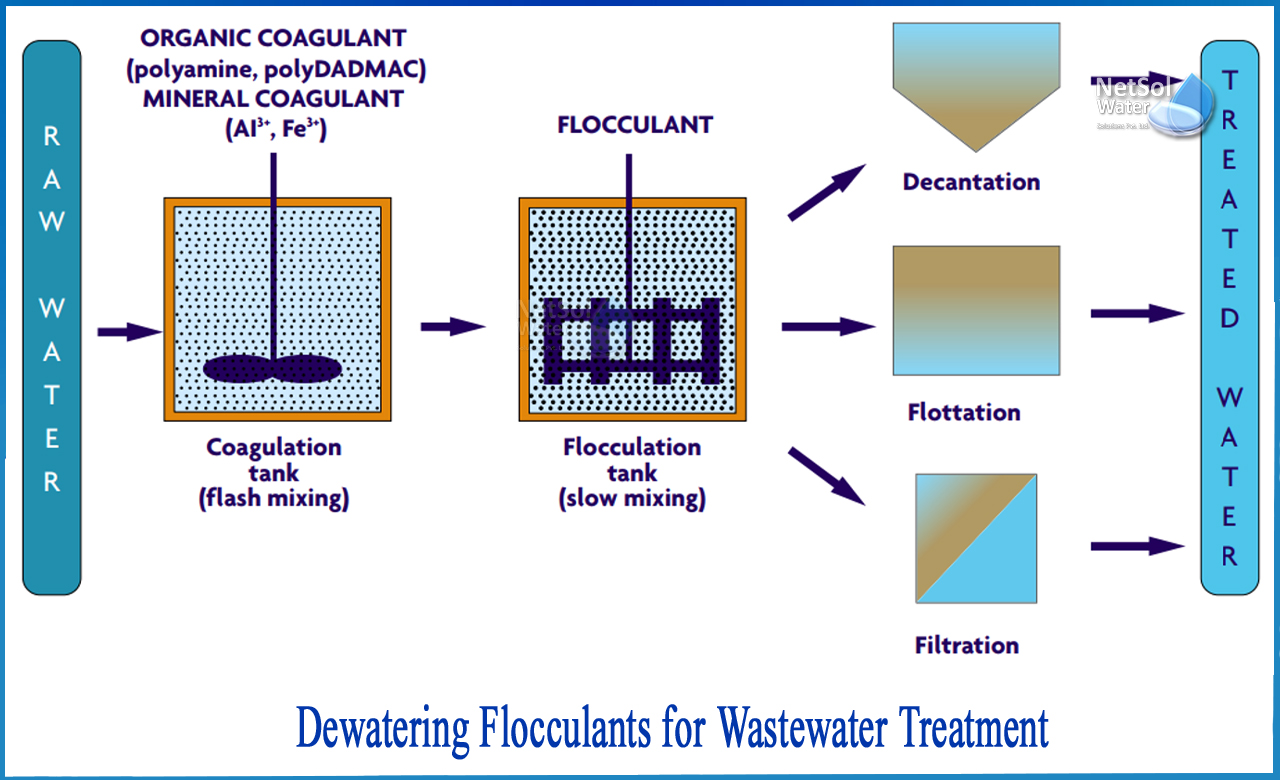Flocculants are used to remove materials floating in water in a variety of industries.
In this blog, we look in-depth at their role in wastewater treatment, including what they are, how they work, and what they are used for. We'll also go over the differences between flocculants and coagulants, another type of wastewater treatment chemical.
What is Flocculation?
The separation of a solution, most frequently the removal of debris from a fluid, is known as flocculation. The phrase comes from the word floc, which means flakes of material, and when silt is flocculated, it forms larger aggregated flakes that are easier to notice and remove. This process can be driven via flocculants and/or physical procedures, or it can occur naturally.
What are Flocculants?
Flocculants are compounds that help fine particles in a solution clump together to form a floc, which either floats to the surface (flotation) or settles to the bottom (settling) (sedimentation). This makes it easier to separate the substance from the liquid.
Organic and inorganic flocculants are available in a variety of charges, charge densities, molecular weights, and morphologies. Organic polymeric flocculants are the most used today because of their ability to generate flocculation with a minimal dosage. However, because to their lack of biodegradability and the concomitant dispersion of potentially toxic monomers into water supplies, the focus is shifting to more environmentally benign biopolymers. They have a shorter shelf life and require a larger dosage than organic polymeric flocculants, which is an issue. To tackle this, combination solutions are being developed, in which synthetic polymers are grafted onto natural polymers to generate customised water treatment flocculants that give the best of both worlds.
What is the use of Flocculants in WWTPs?
Flocculants are used in a wide range of industries, such as civil engineering, earth sciences, and biotechnology, as well as breweries and cheese making. However, flocculants are commonly used in the wastewater treatment industry for solids removal, water clarification, lime softening, sludge thickening, and solids dehydration.
Flocculation with sedimentation is employed in the purification of drinking water, as well as in the treatment of sewage, storm water, and industrial wastewater. This is why flocculants are commonly associated with water treatment plants.
Working of Flocculants
Flocculants can be employed alone or in combination with coagulants, depending on the charge and chemical composition of the solution to be separated.
Coagulants work by forcing particles in a stable solution to become unstable, enabling them to aggregate and allowing flocculants to bind them together. The flocculants combine the particles to form flocs, which are then removed from the solution once they have settled or floated to the surface.
The type of pollutants being removed from the water, as well as the water treatment facility's separation technique, will decide the appropriate combination of organic and inorganic flocculants and coagulants (i.e. sedimentation or floatation, etc.).
Differences between Coagulation and Flocculation
While both coagulation and flocculation are commonly utilised in the treatment and purification of water, they are completely different processes. Coagulation is a chemical process in which the chemical characteristics of a solution are changed to encourage it to coagulate. Coagulants cause the liquid to curdle in the same way as milk does naturally when the pH of the liquid changes and the milk particles clump together. Salts are commonly used as coagulants, and when they break down, they release positive or negative charges.
Flocculation, on the other hand, is a physical process in which particles collide and produce a cloud and eventually a precipitate. Flocculants are usually polymers that cause particles to settle into larger and larger flakes or flocs.Flocculants are still a crucial part of the water treatment process.
Please contact the Netsol Water team immediately if you have any queries about wastewater treatment chemicals or if you would like to discuss your needs in greater depth. Our team is knowledgeable about chemical products for water treatment and will assist you in customising a solution to meet your demands.
Netsol Water is Greater Noida-based leading water & wastewater treatment plant manufacturer. We are industry's most demanding company based on client review and work quality. We are known as best commercial RO plant manufacturers, industrial RO plant manufacturer, sewage treatment plant manufacturer, Water Softener Plant Manufacturers and effluent treatment plant manufacturers. Apart from this 24x7 customer support is our USP. Call on +91-9650608473, or write us at enquiry@netsolwater.com for any support, inquiry or product-purchase related query.



